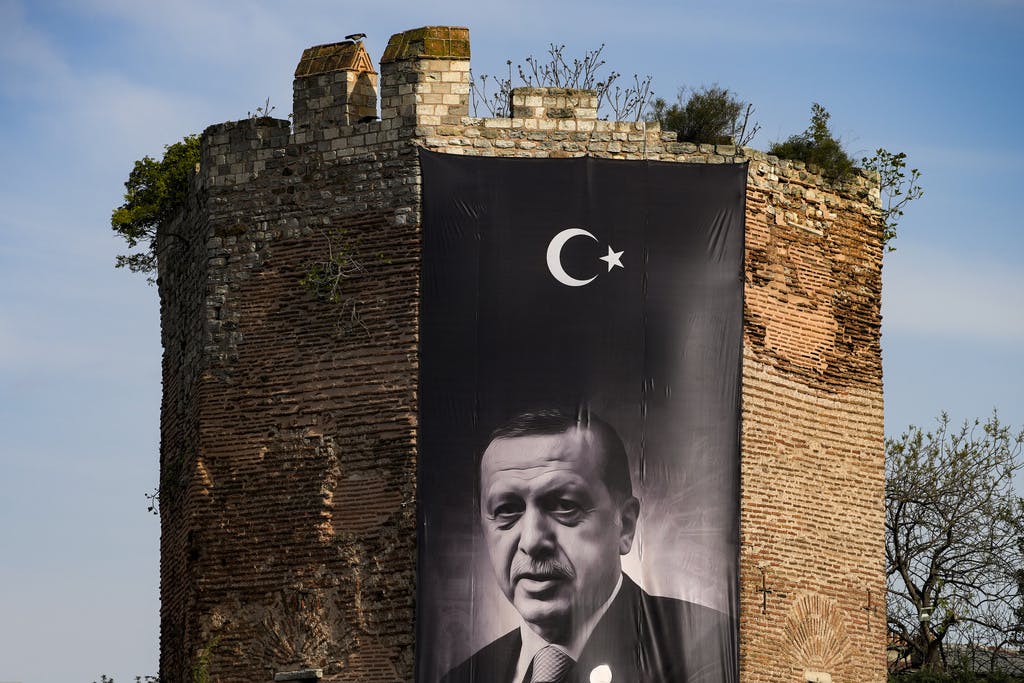Like a Bad Neighbor, Turkey Is There — To Elbow Israel on Trade and Needle Greece at Sea
President Erdogan may be stirring up regional tension in a bid to shore up domestic support, but that is hardly endearing the autocratic leader to Western leaders.

More than two decades ago, President Erdogan’s Justice and Development Party pledged to have “zero problems with neighbors,” but that proposition is looking shaky. War in the Middle East has thrown into sharp relief long-simmering tensions with nearby neighbor Israel and next-door Greece.
Although Turkey’s membership in NATO gives it strategic importance to America, its obdurate stance on regional issues — at least under its current leadership — could undercut its long-term reliability as a true partner for the West.
Ankara has been a vocal critic of Israel’s military campaign against Hamas and announced on Tuesday that it was restricting, with immediate effect, exports of 54 types of products to Israel. These include aluminum, steel, construction products, jet fuel, and chemical fertilizers. In response, Israel said it was preparing a ban on products from Turkey.
The announcements came a day after the Turkish foreign minister, Hakan Fidan, said Israel had barred Turkish military cargo planes from joining an operation to airdrop humanitarian aid to Gaza and vowed to respond with a series of measures against Israel until it declares a cease-fire and allows aid to flow in without interruptions.
Mr. Erdogan’s government, which suffered major setbacks in local elections last month, is facing at home pressure to halt trade with Israel. Critics accuse the government of engaging in double standards by leveling strong accusations against Israel while continuing lucrative commercial relations.
Mr. Erdogan, whose ruling party has roots in Turkey’s Islamic movement, has been an outspoken critic of Israel since taking office in 2003. He stepped up his criticism of Israel following its military offensive in Gaza, describing Israel’s actions as war crimes verging on “genocide” and asserting that Hamas terrorists are fighting for the liberation of its lands and people.
Since January, Turkish authorities have detained dozens of people, including private detectives, on suspicion of spying for Israel, mostly on Palestinians living in Turkey.
In a post on X, the Israeli foreign minister, Israel Katz, said that Mr. Erdogan was “once again sacrificing the economic interests of the people of Turkey for his support of the Hamas murderers in Gaza.”
In the same post, he said he had contacted organizations in America and asked them to stop investing in Turkey and refrain from importing Turkish goods.
With the Justice and Development Party taking a drubbing in recent local elections across Turkey, domestic considerations are likely behind the Turkish decision to slap trade restrictions on Israel. Turkish exports to Israel amounted to $5.4 billion in 2023, according to the Turkish Statistical Institute.
Turkey and Israel had normalized ties by appointing ambassadors to their respective countries in 2022, following years of tensions that reached a peak with the Mavi Marmara incident in 2010.
Then as now the Mediterranean Sea plays a major supporting role in both the problems with Gaza and longstanding frictions between Turkey and neighboring Greece. The Greek government has just announced plans to create two new marine parks, one in the Ionian Sea and the other in the Aegean Sea. The boundaries of the latter will in places be in close proximity to the Turkish coast.
Ankara is not happy about that. On Tuesday the Turkish foreign ministry said in a statement, “We recommend Greece not to involve the outstanding Aegean issues, and the issues regarding the status of some islands, islets and rocks whose sovereignty has not been ceded to Greece by the international treaties, within the frame of its own agenda.”
On Wednesday, the Greek foreign ministry shot back: “The announcement from the Turkish Foreign Ministry politicizes a purely environmental issue.” The statement added that “the practice of transactional diplomacy and the use of hybrid methods for geopolitical advantages are inconsistent with Greek foreign policy.”
What that means is that Athens and Ankara are going to be playing nice — at least for now. Tensions could subside in the eastern Mediterranean in the months ahead. Even if so, it will come as no surprise if old differences heat up the waters of the Aegean, once again inflaming tensions between neighbors that existed long before the Israel-Palestinian conflict and that persist to this day.
